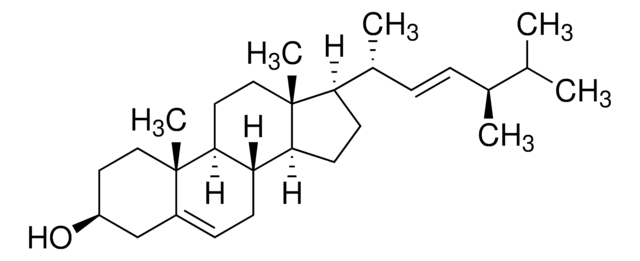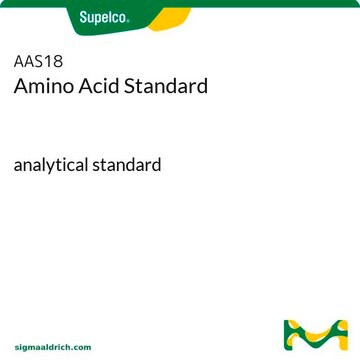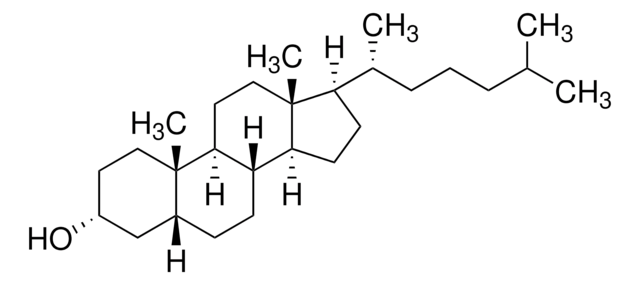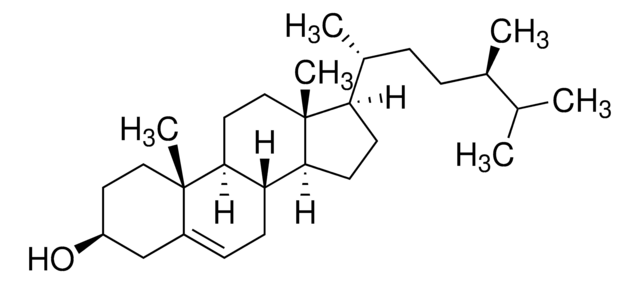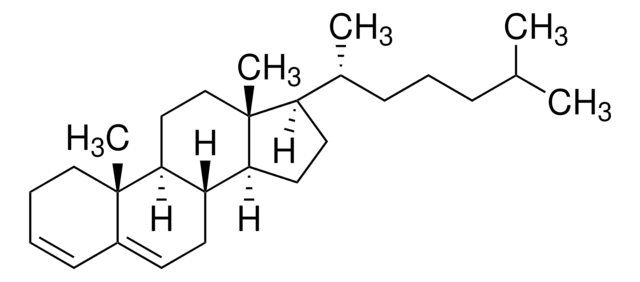C8003
5-α-Cholestane
≥97.0% (HPLC)
Synonym(s):
NSC 224419
About This Item
Recommended Products
Quality Level
Assay
≥97.0% (HPLC)
form
powder
mp
80-82 °C (lit.)
SMILES string
CC(C)CCC[C@@H](C)[C@H]1CC[C@H]2[C@@H]3CC[C@H]4CCCC[C@]4(C)[C@H]3CC[C@]12C
InChI
1S/C27H48/c1-19(2)9-8-10-20(3)23-14-15-24-22-13-12-21-11-6-7-17-26(21,4)25(22)16-18-27(23,24)5/h19-25H,6-18H2,1-5H3/t20-,21-,22+,23-,24+,25+,26+,27-/m1/s1
InChI key
XIIAYQZJNBULGD-XWLABEFZSA-N
Looking for similar products? Visit Product Comparison Guide
Application
- as an internal standard in gas phase chromatography (GC) and high-performance liquid chromatography (HPLC) to quantify cholesterol in meat products for a comparison study
- to quantify the active compounds in the oils using a gas chromatograph coupled to a mass spectrometer
- as a reference standard in GC analyses to quantify sterol content in the unsaponifiables obtained from oat lipids and different sterol standards like fucosterol, sitosterol, campesterol, and stigmasterol
Biochem/physiol Actions
Preparation Note
Storage Class Code
11 - Combustible Solids
WGK
WGK 3
Flash Point(F)
Not applicable
Flash Point(C)
Not applicable
Personal Protective Equipment
Regulatory Listings
Regulatory Listings are mainly provided for chemical products. Only limited information can be provided here for non-chemical products. No entry means none of the components are listed. It is the user’s obligation to ensure the safe and legal use of the product.
JAN Code
C8003-100MG:
C8003-1G-PW:
C8003-VAR:
C8003-500MG:
C8003-5G-PW:
C8003-BULK:
C8003-1G:
C8003-5G:
C8003-250MG:
C8003-100MG-PW:
Certificates of Analysis (COA)
Search for Certificates of Analysis (COA) by entering the products Lot/Batch Number. Lot and Batch Numbers can be found on a product’s label following the words ‘Lot’ or ‘Batch’.
Already Own This Product?
Find documentation for the products that you have recently purchased in the Document Library.
Customers Also Viewed
Our team of scientists has experience in all areas of research including Life Science, Material Science, Chemical Synthesis, Chromatography, Analytical and many others.
Contact Technical Service

